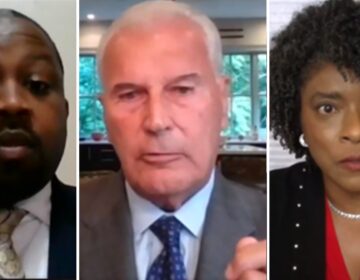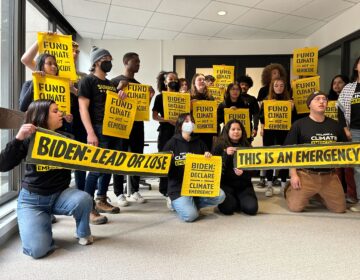Wilmington mayor’s primary election foes share ‘people over property’ slogan
Mike Purzycki emerged from a field of seven Democratic candidates in 2016 to become mayor. His two challengers in 2020 say he hasn’t done enough for neighborhoods.
Listen 3:18
Left to right: Former City Councilman Justen Wright, Wilmington Mayor Mike Purzycki and Treasurer Velda Jones-Potter squared off in an online debate in August ahead of the Sept. 15 Democratic primary. (Wilmington Democrats/Facebook)
Wilmington Mayor Mike Purzycki urges voters to look around the city — to the new parks, recreation centers, downtown apartments and restaurants, Philadelphia 76ers’ sports complex, and other amenities that have sprouted since he took office in January 2017.
He wants them to consider the 42 miles of new roads, upgraded water and sewer systems, and what he says is a more efficient government in Delaware’s largest city.
Purzycki hopes residents take into account the fact that, until a surge in shootings in recent months, gun violence had dropped dramatically over two years in the city’s hardest-hit neighborhoods.
He points to a program that has helped thousands of kids enroll in college and even brought basketball icon Magic Johnson to town for a recruitment event that drew national television coverage.
“I don’t have to promise anybody anything,’’ Purzycki recently told WHYY News, with the Sept. 15 Democratic mayoral primary looming. “I can just say, ‘Take a look at what I’ve accomplished over the last 3 1/2 years, and if you are happy then just please re-elect me.’”
But his two primary opponents — City Treasurer Velda Jones-Potter and former City Councilmember Justen Wright — are trying to convince voters they are the better choice to lead Wilmington over the next four years. Ironically, both are using the same slogan, “People over Property,” in their campaigns.
That mantra is a shot at a mayor they contend is more of a friend to developers and corporate interests than to residents of the many low-income neighborhoods whose streets are lined with vacant row homes with windows and doors covered with plywood, and where people live in fear of flying bullets. Just a few days ago, an 11-year-old girl was struck by random gunfire in West Center City a few blocks from downtown.
“I think the evidence that our neighborhoods have been neglected is in looking at the housing stock that continues to be boarded up and unoccupied and in the unkept condition of the neighborhood with them not being cleaned and cared for,’’ Jones-Potter told WHYY.
“It’s evident most in the proliferation of violence across our city, and that’s all evidence and representative of the lack of attention and investment in neighborhoods.”
Wright voiced similar concerns.
“Wilmington is at a point where it needs leadership that’s focused on empowering residents and building up our neighborhoods,’’ Wright said. “I just want to ensure that residents have the same opportunity as I’ve had, of faith, hope and promise.”
All 3 candidates had close elections in 2016
Purzycki, 75, is a lawyer and former New Castle County councilmember who spent 20 years leading the Riverfront Development Corporation that revitalized what had been an industrial wasteland along the Christina River.
The area now boasts over 7,000 employees from companies such as Barclay bank, more than 1,200 residents in swank apartments, plus an IMAX movie theater complex, restaurants and, within the last year, two new hotels.
Purzycki won the 2016 election by defeating six other candidates, including first-term incumbent Dennis Williams and then-City Council President Theo Gregory in the primary — which, in heavily Democratic Wilmington, is almost a guaranteed victory. It’s been nearly 50 years since Wilmington had a Republican mayor.
Purzycki squeaked to victory in the primary by 234 votes out of 12,578 votes cast.
Political observers credited his victory in large part to the fact that more than 1,200 voters in and around his neighborhood in Wilmington’s affluent Highlands switched their registration from Republican to Democrat.
Purzycki also became Wilmington’s first white mayor since 1992. Nearly 70% of the city’s 72,000 residents are Black or Latino. Both Jones-Potter and Wright are Black.
Jones-Potter, 61, would be the city’s first female mayor if elected. She became treasurer the same time Purzycki become mayor, also winning by a slim margin — 362 votes in a three-way race.
Her election to citywide office came just three years after a short, ill-fated stint as Mayor Williams’ chief strategist ended with her being fired for abusing her authority. Williams concluded she violated the city’s ethical code of conduct by arranging police coverage at a hip-hop festival her son helped run, leading the city to spend more than $18,000 in taxpayer money on the event.
She had previously spent two years as state treasurer after Jack Markell appointed her to finish out his term as treasurer when he was elected governor in 2008. She lost a race for the office in 2010.
Wright, who owns a funeral home, would be the city’s youngest mayor if elected. He’ll turn 37 this month.
Wright was a councilmember for eight years before finishing second to Hanifa Shabazz by 635 votes in a three-way race for City Council president in 2016.
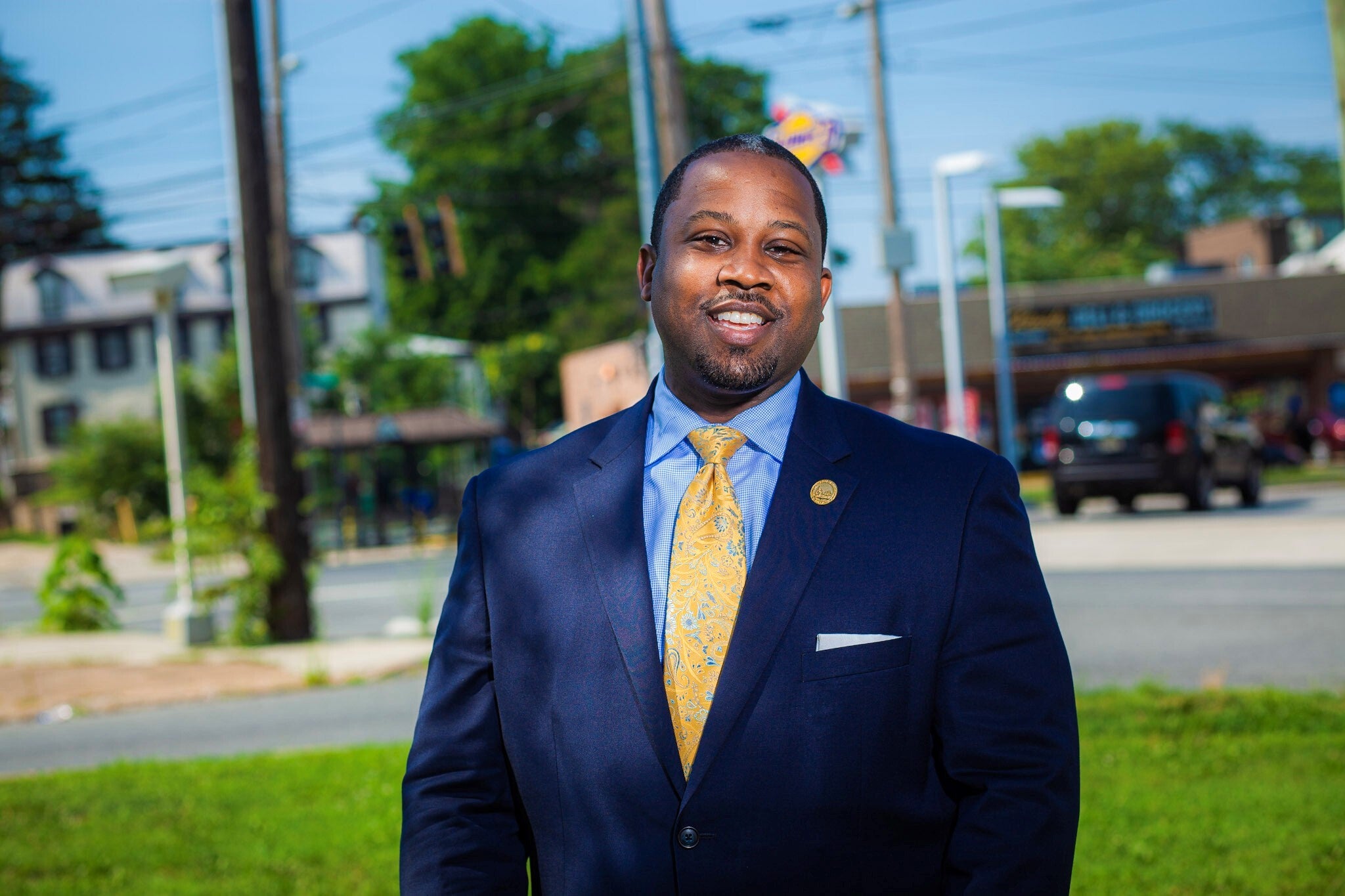
Wright says his 8 years on City Council sets him apart
Wright contends his two terms on the 13-member council differentiates him from his competitors, neither of whom have held a council seat, because the job “has given me the opportunities to build consensus.”
He says the ties he forged while growing up in Wilmington and spending eight years on the council will help him earn approval for initiatives such as creating the position of public health commissioner. The office would help the city recover from the scourge of the novel coronavirus by testing and tracing city residents and employees, and working to address “systemic inequities’’ in how the virus impacts Black residents.
Saying Purzycki has spent too much taxpayer money on the riverfront and downtown, Wright wants to focus economic development on what he calls “neighborhood inclusion” and to “recruit and retain small, mid-sized businesses.”
He agrees with Jones-Potter that the city should improve the gateways to downtown, such as the corridor down Fourth Street on the west side and Market Street to the northeast.
Wright also takes issue with Purzycki’s handling of crime.
Purzycki has trumpeted his 2017 hiring of former New York and Chicago police leader Robert Tracy as Wilmington’s first chief from outside the department, as well as a 60% drop in shootings the following year. Wright says this year’s gun violence tells a more grim story.
Already this year, 119 people have been shot, five more than in all of 2019, Wright said.
“The stats speak for themselves,’’ Wright said. He acknowledged the drop in gun violence in 2018 was substantial but stressed, “Look at where we are now.”
Besides saying Tracy’s efforts aren’t succeeding, Wright calls him an “overpriced chief.” When Tracy was hired in April 2017, he was paid $160,000, an amount that has grown to $190,800 and makes him by far the highest-paid city employee. The city’s previous police chief, Bobby Cummings, was paid $130,000. The mayor’s salary is $117,700.
Purzycki countered that Tracy is worth every penny and “has transformed the department and instilled a new policing culture that has greatly benefited the people of Wilmington. Under his leadership, community policing is not just a phrase, but a working policy and practice.”
Wright also criticized Purzycki for not deciding to equip police with body cameras until June, after protests erupted over the killing of George Floyd at the hands of Minneapolis police officers.
“And now, because it’s political season, he’s investing $800,000 in body cameras. That’s sad,” Wright said.
Wright also mentioned the ethical controversy and “accusations of nepotism” that got Jones-Potter fired in 2013 from her city job.
“Wilmington needs someone they can count on,’’ he said, “who’s going to represent the people of Wilmington, protect the public trust and invest in neighborhoods.”
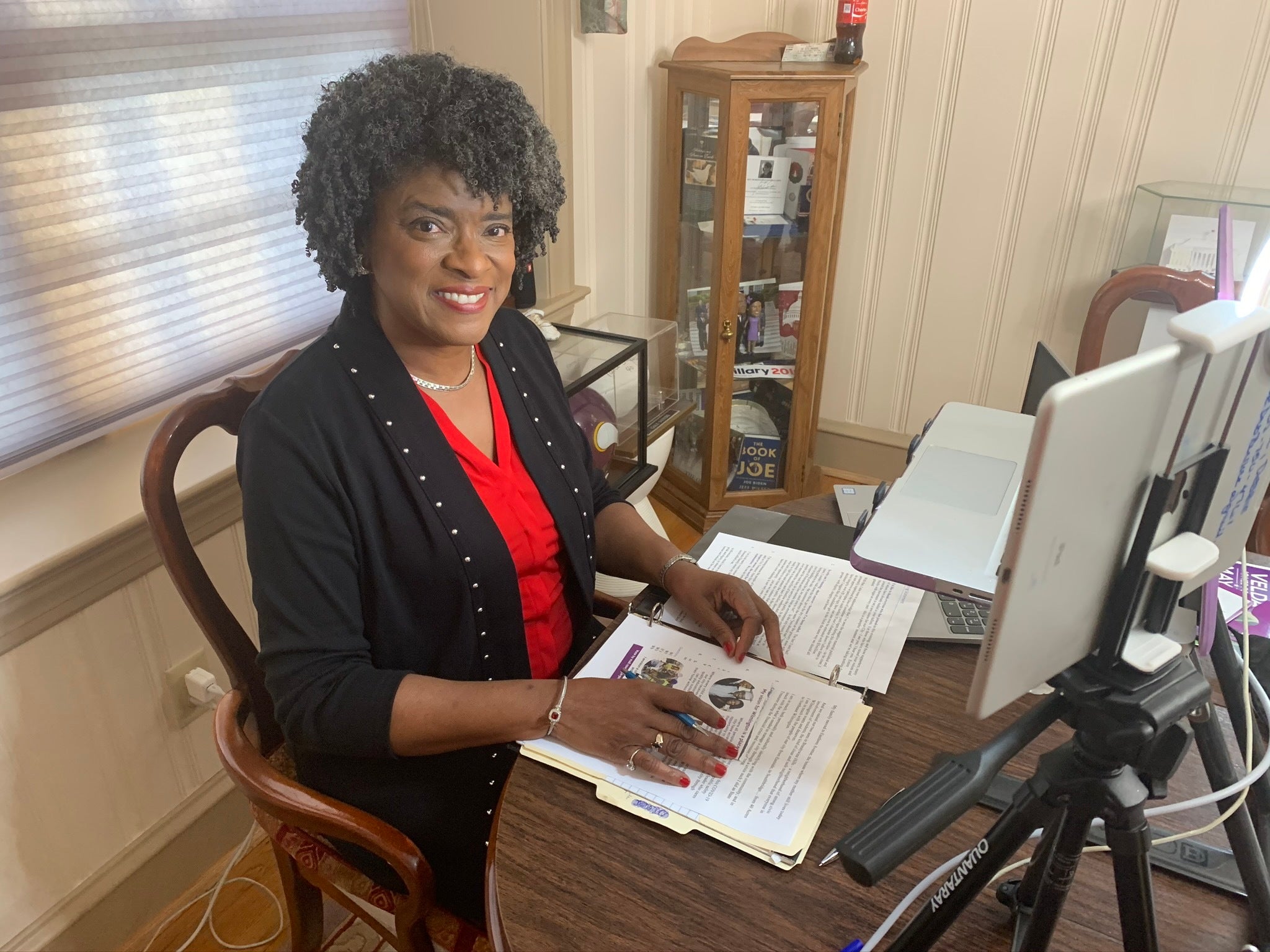
Jones-Potter says city needs ‘motherly love’
Jones-Potter said Wilmington needs a mayor whose administration will create change that “includes people all across the city, and opportunity and access to the benefits that our government brings to our citizens.”
Downtrodden neighborhoods “need attention and investment and strengthening,’’ she stressed. “I am the right leader for this city at this time.”
She pointed out that as the daughter of a Wilmington longshoreman whose family lived in public housing until they could afford to buy a home, she best understands the needs of residents “in every corner of the city.”
The city needs to invest more heavily “in the development of people and help them really become homeowners, individual by individual,’’ she said. “Become a homeowner who is invested in their neighborhoods, who then have some stability and can become part of the community.”
“Until we intervene with the violence that’s going on, and return to the kind of programmatic effort that can mediate the excessive gun and group violence, until we get people in those neighborhoods hope and access to opportunity, we’re going to continue to see that this city can never be more than its weakest neighborhood.”
She also asserted that it’s long past time for a woman to take the helm.
“We need in this city motherly love, the kind of caring that’s going to lead to us really attending to the heart and the needs of the people within our city,’’ Jones-Potter said. “And yes, we’ve had a couple hundred years of leadership by men in this city, so I do think it’s time for a woman to lead this city. And a qualified, capable woman.”
Jones-Potter also addressed her ongoing philosophical and legal dispute with Purzycki and their battle in Chancery Court over the power of the city treasurer.
The fight stems from a $3.4 million bank loan the city had guaranteed before Purzycki took office for the since-collapsed public-private Wilmington Housing Partnership, which bought up too many properties that it didn’t renovate and re-sell before donations dried up. Potter wanted to pay off the loan with cash reserves, but Purzycki restructured the debt.
“The people elected me to the office to be a steward of their money, basically,’’ she said. “There has to be transparency to the public and accountability for every dime that comes into this city.”
“For $3.4 million to have been made available for rehabbing and refurbishing homes and seven years later the homes aren’t refurbished and the area is still blighted and there’s no accounting for what’s happened to $3.4 million, is unacceptable.”
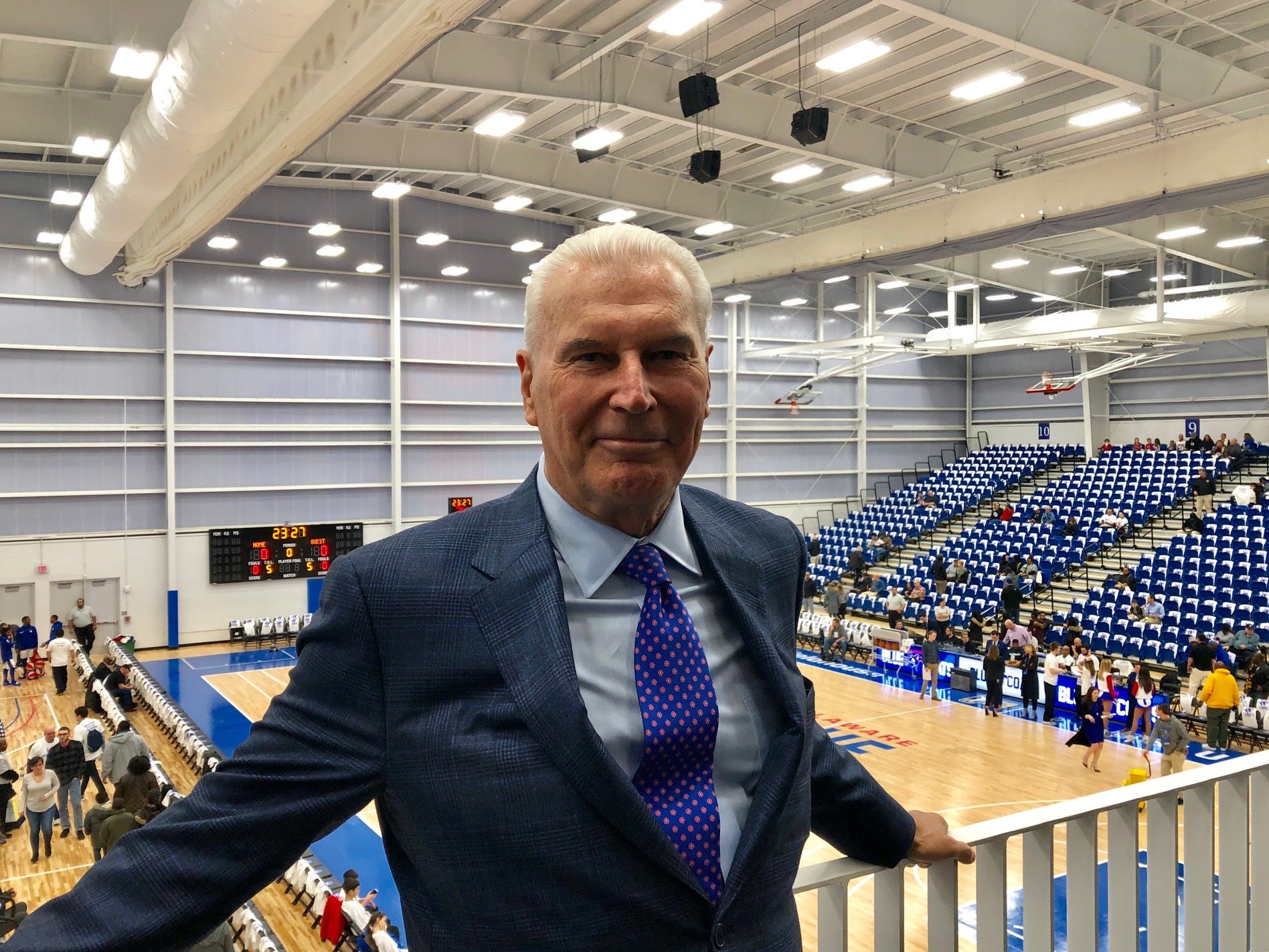
Purzycki hopes people ‘appreciate’ his accomplishments
Purzycki says he and Potter have a fundamental disagreement about the structure of city government.
“I think that the city should have one mayor and I think she believes the city has two mayors and our dispute is always over that,” he said. “We think the charter is very clear that the treasurer is part of the administration. She does not have her own separate independence and basically has to execute the financial direction of the administration and council.”
As for the state of the city, Purzycki said he hopes residents all over Wilmington realize his team has been working painstakingly to improve every neighborhood, and that big projects improve their lives.
The city, for example, is supporting but not financing the approximately $100 million Reach Riverside initiative to rebuild the public housing complex where Potter once lived, and to improve that Northeast Boulevard corridor with better schools, medical care, food options and more. That project coincides with The Warehouse, a new center nearby for teens to socialize, learn and play.
“I feel really well about the condition of things,’’ Purzycki said while acknowledging that “we still have work to do in the neighborhoods.”
If re-elected, Purzycki is counting on the next council to pass his bill that would help the city crack down “against irresponsible landlords.”
Purzycki also stressed that Tracy and his administration are doing everything possible to curb neighborhood violence.
“I think the problem we have are America’s problems. They visit us here. They go to Chicago and Philadelphia and Baltimore and a lot of cities where young men feel alienated from the system,’’ he said. “We have to figure out a way to incorporate those lives more into the middle-class life that stabilizes society.”
He says the city’s already “fragile communities” have seen tensions grow during the coronavirus crisis.
“All of a sudden you put in a pandemic where the people who are working can’t work, where the schools aren’t even functioning, so the kids aren’t even going to schools,’’ he said. “So you find that the institutions that kind of pull the community together have been frayed because of COVID. The churches are not as utilized as they were. Organizational meetings aren’t able to take place. You can’t get a bunch of kids in a gym anymore. So it really frays the institutional stability of our neighborhoods.’’
Despite the current spike in street crime, Purzycki says the city is moving forward and can progress further under his watch.
“When you have a good record,” the mayor said, “you just hope people appreciate it.”

Get daily updates from WHYY News!
WHYY is your source for fact-based, in-depth journalism and information. As a nonprofit organization, we rely on financial support from readers like you. Please give today.



